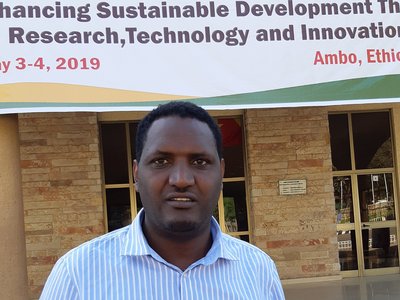

Scholarship holder Geda Kebede Oncho is currently a PhD student at the University of Natural Resources and Life Sciences, Vienna. In his research conducted under the framework of the LARIMA project, Geda studies the assessment of microbiological water quality of streams and rivers in central highlands of Ethiopia.
River Awash is one of the major surface water sources used by millions of people in the central Highlands of Ethiopia. Despite the use of this water resource for decades to sustain human life, the comprehensive picture of microbiological safety of this type of water is unfortunately unknown. In addition, while the host specific fecal markers have been used as fecal source identifiers in many places around the globe, their use in identifying the source of fecal bacteria in river waters has not been performed in Ethiopia. Hence, his study is to understand the extent and sources of bacterial fecal pollution in upper Awash River. It compared physico-chemical parameters, fecal indicator bacteria (E. coli and Enterococci) as well as benthic macroinvertebrate indices as indicators of water quality in the upper Awash River in Ethiopia.
It was found that river water quality decreased in downstream direction which reflected the effect of anthropogenic activities in the catchment. Tested physico-chemical parameters and fecal indicator bacteria increased from upstream to downstream sampling sites, while biotic indices values decreased. The concentrations of both fecal indicator bacteria exceeded the standards set by the European Union and the World Health Organization for safe recreational water. Hence, all sites were categorized as poor for bathing and recreation. In contrast, three African benthic macroinvertebrate based indices indicated a natural or good water quality with slight ecological degradation at the upstream sites, and a moderate to poor ecological status at the downstream sites. While macroinvertebrate indices were able to reflect anthropogenic disturbances, mainly caused by different land use and instream activities, fecal indicator bacteria, most likely driven by the high pressure of extensive livestock fecal emission and overgrazing in the whole catchment, did not. With his study Geda underlines the necessity of combining different indicator systems to analyze human pressures in Africa in a holistic way, which can serve as a basis for a more holistic management and sustainable use of fundamental resources such as water from freshwater ecosystems.
Geda Kebede Oncho is currently a PhD student at the University of Natural Resources and Life Sciences, Vienna. He holds a Master Degree in Applied Microbiology from Addis Ababa University and a Bachelor’s degree in Biology from Alemaya University. He joined the Ambo University as lecturer in 2008.
